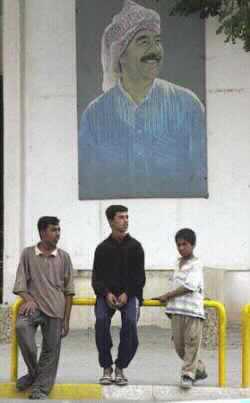- Author:
& News Agencies - Section:
WORLD HEADLINES
- Hajj & Umra WORLD HEADLINES
Factions Could Battle if Saddam Out

Even before hostilities erupt in a war with Iraq, what happens the day after President Saddam Hussein falls is raising critical questions. A new and legitimate authority may take time to emerge, civil war could break out between the majority Shiite and minority Sunni Arabs, and Kurds in the north might press for an independent state, which U.S. ally Turkey opposes.
Arab cities outside Iraq could explode in anger at a time when the United States is fighting a war on terror that rankles many Muslims, say Mideast analysts and Iraqi exiles.
Depending on damage from the fighting, refugee and relief problems that require massive aid could confront the United States. A U.S. military presence to protect Iraq's territorial integrity while a transitional government takes over seems certain.
But the kind of government and leadership is the subject of intense discussion among the Iraqi exile community and within the Bush administration.
Secretary of State Colin Powell , publicly, has confined himself to saying he foresees a "government of Iraqis governing Iraqis in a democratic fashion."
The State Department is reviewing scenarios ranging from a military leader in the current government taking power to formation of an interim government of Iraqi exiles.
Department spokesman Richard Boucher said Friday the United States has worked since April with Iraqi academics and exiles to develop post-Saddam policies in such fields as democratic principles, public accounting and water resources.
More than a dozen Iraqis engineers and scientists are meeting in Washington this weekend to discuss water, agriculture and the environment.
The different working groups "have focused on challenges faced by a post Saddam Hussein government in a number of areas that are of vital importance to the health and prosperity of all Iraqis," Boucher said.
Secretary of Defense Donald H. Rumsfeld said a new government should be "one that would keep Iraq together as a single country ... and one that respected the rights of individuals as well as minority groups."
The United States would need international help to rebuild the country, he said.
Ahmed Chalabi, a leader in the Iraqi National Congress, a London-based umbrella opposition group, said at a seminar this week on Iraq's future that many Iraqis "are skeptical and apprehensive about the U.S. commitment to democracy in post-Saddam Iraq."
Chalabi would like to be named head of a provisional government to be formed either before military action starts or as soon as Saddam falls. Chalabi's chances, however, are considered slim because he does not have the support of other opposition exile groups.
The congress plans a conference in London in October to elect a committee to oversee activities of the opposition groups.
They include two Kurdish organizations and the Supreme Council for Islamic Revolution, which has broad support from the majority Shiites inside Iraq.
Rend Rahim Francke, executive director of the Iraqi Foundation, a human rights group, said the Bush administration appears hesitant to deal with Iraq after Saddam.
"There seems to be extraordinary reluctance to endorse a transitional authority for the day Saddam falls or before" and a vacuum might result that would benefit antidemocratic groups, she said Thursday at a seminar on the topic that was sponsored by the American Enterprise Institute, a Washington policy research group.
Another participant, Richard Perle, a consultant to Rumsfeld, said a "dangerous idea" making the rounds, particularly in the State Department, "is that in a post-Saddam Iraq power will flow to Iraqis already on the scene."
He said the basis for such thinking was that Iraqi exiles who have labored for the country's liberation "somehow have less credibility than those who have found a way to get along with Saddam's regime." That view was "profoundly mistaken," said Perle, a senior Pentagon official in the Reagan administration and now chairman of the Defense Policy Board, a group of outside advisers to the Defense Department.
Perle also poured cold water on the idea that the whole of the Arab world would align itself with Saddam in a war.
"This is a demeaning, condescending view of Arabs," he said. "When it becomes clear military action will produce a new future (for Iraq), the Arab world or most if, certainly most of the Muslim world, will consider honor and dignity has been restored by removing a regime they have every reason to despise along with the rest of us."
PHOTO CAPTION
Three Iraqi young men sit in front of a portrait of President Saddam Hussein in Baghdad, Friday, Oct. 4, 2002, while waiting for a bus to take them home. Bush says he wants Saddam toppled and accuses the Iraqi leader of stockpiling nuclear, chemical and biological weapons and harboring terrorists. (AP Photo/Jassim Mohammed).
Related Articles
 Hajj virtues
Hajj virtues
-
School of Faith in Ten Days of Thul-Hijjah
The believing human self needs strong provocations in order to awaken whenever it is enveloped by laziness in...
-
The Status of Hajj in Islam
Hajj is the fifth pillar of Islam; Allah, The Exalted, ordained it in the ninth year after Hijrah (the Prophet's,...
-
School of Faith in Ten Days of Thul-Hijjah
The believing human self needs strong provocations in order to awaken whenever it is enveloped by laziness in relation...


 Home
Home Discover Islam
Discover Islam Quran Recitations
Quran Recitations Lectures
Lectures
 Fatwa
Fatwa Articles
Articles Fiqh
Fiqh E-Books
E-Books Boys & Girls
Boys & Girls  Hajj Rulings
Hajj Rulings Hajj Fatwas
Hajj Fatwas












